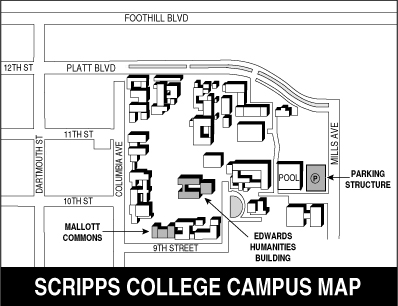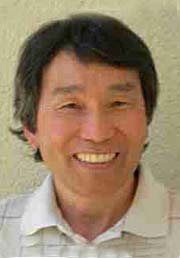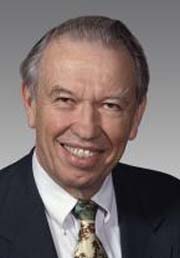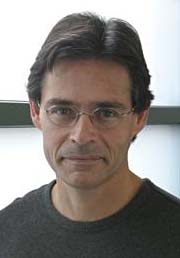Register
Click here to register on-line, and pay by credit card (deadline 5 pm, October 7th).
Click here to register by mail, and pay by check (deadline October 6th).
Fall 2008 SoCal-Nev Section Meeting
Scripps College, Claremont, CA (Directions and Map)
Saturday, October 11, 2008
Tentative Program
- 8:00-11:45 Registration
Edwards Humanities Building Courtyard - 8:30-2:30 MAA Book Sale
Edwards Humanities Building Courtyard
Organized by Richard Katz and Michael Hoffman, Cal State Los Angeles - 9:00-10:00 Invited Address by Stephen Abbott, Middlebury College
Mathematics as Art in Contemporary Drama
Edwards Humanities Building Auditorium - 10:00-10:15 Section Business Meeting
Edwards Humanities Building Auditorium - 10:30-11:45 Faculty and Student Contributed Paper Sessions
Call for contributed papers
Edwards Humanities Building, Rooms to be announced
Organized by Michael Orrison, Harvey Mudd College - 11:45-1:15 Luncheon with Invited Address by Bruce Yoshiwara, Pierce College (Teaching Award Recipient)
The Weapon of Choice
Mallott Commons, Hampton Dining Room - 1:15-2:15 Invited Address by George Andrews, Pennsylvania State University
The Lost Notebook of Ramanujan
Edwards Humanities Building Auditorium - 2:30-3:30 Invited Address by Tony DeRose, Pixar Animation Studios
Math in the Movies
Edwards Humanities Building Auditorium
Directions and Maps
Scripps College is in Claremont, California. For local maps and directions, see the campus website at www.scrippscollege.edu/about/campus-map.php. Meeting parking is free in the parking structure on Mills Avenue indicated on the map below. Registration, refreshments, and the MAA Book Sale will be in the courtyard of the Edwards Humanities Building. The first invited address will be in the Edwards Humanities Building Auditorium.

Register
Click here to register on-line, and pay by credit card (deadline 5 pm, October 7th).
Click here to register by mail, and pay by check (deadline October 6th).
Registration Fees
| Registration | |
| Nonmember | $35 |
| MAA Member | $30 |
| Student | $12 |
| Registration and Luncheon | |
| Nonmember | $50 |
| MAA Member | $45 |
| Student | $20 |
On-site registration will be available for the meeting, but will be $5 more than the pre-registration charge.
Register on-line
Click here to access on-line registration, and pay by credit card.
Register by mail
Click here for a pdf of the preregistration form. Trouble viewing the pdf?
Stephen AbbottMiddlebury College |
Stephen Abbott graduated from Colgate University in 1986 and received his PhD from the University of Virginia in operator theory and functional analysis in 1993. Since going to Middlebury, his research interests have migrated to more classical real analysis where he has enjoyed collaborating with students on projects involving Hausdorff measure, "slow points," and various classes of nowhere differentiable functions. Abbott's interest in theatre started about 10 years ago when he was a consultant for a Middlebury production of Arcadia and has continued in the form of a sporadic series of team-taught courses with various members of the Middlebury Theatre Department.
|
Mathematics as Art in Contemporary Drama
The critical success of Tom Stoppard's Arcadia in the early 90s shattered the conception that mathematics represented an off-putting and off-limits part of the intellectual spectrum for artists interesting in writing for a popular audience. Since Arcadia, we have witnessed the emergence of a host of successful plays that deal with mathematics and mathematicians in thoughtful and creative ways. Some of the most well-known examples include Proof, by David Auburn, winner of the Pulitzer Prize in 2000, and Copenhagen, by Michael Frayn, which won the 2001 Tony Award for best play. Beyond these highly celebrated scripts, one can find a rich array of plays that are perhaps even more authentically mathematical. Set at a (mostly) fictional mathematics conference on the bitter English coastline in the winter of 1911, The Five Hysterical Girls Theorem, by Rinne Groff is a dark comedy about love, genius, aging and priority. In Lovesong of the Electric Bear, Snoo Wilson offers a fanciful, post-modern portrait of the tragic life of Alan Turing. Most recently, A Disappearing Number won the 2008 Olivier Award for Best Play for its dramatization of the fascinating relationship between Hardy and Ramanujan. We will take a first hand look at some of these scripts and explore the complementary ways in which mathematicians and artists carry out their respective searches for truth.
Bruce YoshiwaraPierce College
Teaching Award Recipient

|
Bruce Yoshiwara has been teaching full-time at Los Angeles Pierce College since 1989, except for a Fulbright Teacher Exchange at Barnsley College, England, in 1998-1999. He is AMATYC’s Beyond Crossroads Implementation Coordinator, an associate editor for the Journal of Online Mathematics and its Applica- tions, and past chair of the MAA’s Committee on Technologies in Mathematics Education. He is a member of the writing team for UCLA’s Mathematics Content Program for Teachers, a consultant for the MAA’s Project NExT, a Consulting Colleague for AMATYC’s Project ACCCESS, and serves on the board of California Mathematics Council Community Colleges-South. He is co-author of several algebra and prealgebra textbooks and is the only community college faculty member to have served as Content Review Panelist for California’s Mathematics Primary Adoption process. Yoshiwara also is the 2008 recipient of the MAA Southern California- Nevada Sections Distinguished Teaching Award. |
The Weapon of Choice
We have an expanding arsenal of technological tools to help our students learn mathematics. Unfortunately, a tool misused can cause damage, and powerful tools can cause great damage. In this talk we consider some of the things that have worked (e.g. web-based homework), some of the things that have failed (e.g. web-based homework), and some new things that look promising (e.g. web-based homework?).
George AndrewsPennsylvania State University
|
George Andrews is Evan Pugh Professor of Mathematics at Pennsylvania State University and an expert on the theory of partitions. He has a long-term interest in the work of Srinivasa Ramanujan, whose last notebook he unearthed in 1976. He is now collaborating with Bruce Berndt on a series of volumes explicating the brilliant and sometimes enigmatic ideas in this notebook. The first volume in this series appeared in 2005. Andrews has written more than 250 papers and several books on number theory and the theory of partitions. He was elected to the American Academy of Arts and Sciences in 1997 and the National Academy of Sciences in 2003. He is 2007-2009 MAA Polya Lecturer and is President Elect of the American Mathematical Society. Andrews earned B.S. and M.A. degrees at Oregon State University and the Ph.D. degree at the University of Pennsylvania under Hans Rademacher. |
The Lost Notebook of Ramanujan
In 1976, quite by accident, I stumbled across a collection of about 100 sheets of mathematics in Ramanujan's handwriting; they were stored in a box in the Trinity College Library in Cambridge. I titled this collection "Ramanujan's Lost Notebook" to distinguish it from the famous notebooks that he had prepared earlier in his life. On and off for the past 32 years, I have studied these wild and confusing pages. Some of the weirder results have yielded entirely new lines of research. I will try to provide a gentle account of where these efforts have led. The result that most frightened me (I tried to ignore it for 26 years) will conclude the presentation.
Tony DeRosePixar Animation Studios
|
Tony DeRose is currently a Senior Scientist and lead of the Research Group
at Pixar Animation Studios. He received a BS in Physics in from the
University of California, Davis, and a Ph.D. in Computer
Science from the University of California, Berkeley. From 1986
to 1995 Dr. DeRose was a Professor of Computer Science and
Engineering at the University of Washington. In 1998, he was a major
contributor to the Oscar winning short film "Geri's game", in 1999 he
received the ACM SIGGRAPH Computer Graphics Achievement Award, and in
2006 he received an Academy Award for his work on surface representations.
|
Math in the Movies
Film making is undergoing a digital revolution brought on by advances in areas such as computer technology, computational physics, geometry, and approximation theory. Using numerous examples drawn from Pixar's feature films, this talk will provide a behind the scenes look at the role that math plays in the revolution.Call for Contributed Papers
Students (undergraduate and graduate) and faculty are invited to submit short proposals for 15-minute talks in the Contributed Paper Session of the Fall Meeting. All topics will be considered. The selection of talks will be based on interest to the expected audience and on scheduling constraints.
Submissions for all contributed papers should contain a title, an abstract (not to exceed one-half page and suitable for inclusion in the conference program), the desirable mathematical background of the audience, and any special presentation display needs other than an overhead projector.
Please email all submissions to Michael Orrison at orrison@hmc.edu. The submission deadline is October 1, 2008.